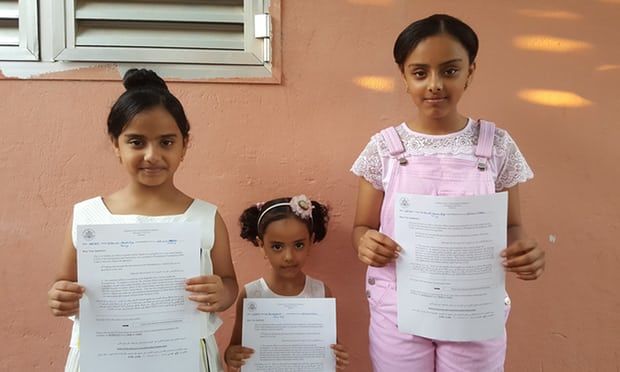
The Guardian takes an intimate look at those affected by Trump’s third version of his Muslim Ban which targets those with visas from Syria, Iran, Somalia, Yemen, Libya, North Korea, Chad and Venezuela. After months of legal obstacles, the ban went into affect last December. Immigration lawyers are reporting that their clients are receiving denials “en masse,” and as a result, families are tragically being separated. The Guardian takes a look at the people and families directly affected by the ban —
— Ramy Almansoob is a US citizen who was born in Yemen. In 2015, he moved to Virginia with the plan that his wife and three daughters would ollow and escape their war-torn home country. On December, 2017, after a lengthy vetting process, the visas were finally approved but that unfortunately was the same day that the the US supreme court ruled that the Travel Ban would go into effect. And Yemen was on that list. The embassy gave the family a notice saying that they were now ineligible. No waivers would be granted and that the denial was said to be final. “These children are not dangerous. If you want to make America great again, it starts with children,” says Ramy, 34. “I need them with me.”
— Seyed Mousavi is a 24-year-old Los Angeles resident originally from Iran, who graduated from the University of Southern California and met his fiancee, Arefé Fayazbakhsh, in Iran. Sayed was relieved to hear that his fiancee’s visa was approved last year. But now, the embassy in Yerevan in neighboring Armenia said she was being rejected and that no waiver would be considered due to the travel ban. “I’m trying my best to find a solution,” says Sayed, who says he is struggling with the ongoing separation. “I’ve invested so much into being American and calling this place home… I try my best to be there for her all the time … but all she’s telling me is, ‘I want you to be by my side.’ It’s heartbreaking.”
— Behnam Babalou is a 39-year-old Iranian man who has a son with US citizenship. Since 2013, he has been trying to get visas for his family. Behnam is a civil engineer who has invested in a California company which should make him eligible for a visa that supports entrepreneurs. His case, which was stuck in red-tape for two years, was flatly denied on December 22nd. “This news was so sudden and unexpected.We just don’t know what to do,” says Behnam, still in Iran, via a translator. “We feel like we have been betrayed.”



